|
|
|
Sort Order |
|
|
|
Items / Page
|
|
|
|
|
|
|
| Srl | Item |
| 1 |
ID:
123600
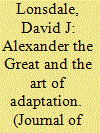

|
|
|
|
|
| Publication |
2013.
|
| Summary/Abstract |
Alexander the Great campaigned successfully for twelve years, across the range of military operations, against a wide range of opponents, and within many varied geographical environments. This article argues that this remarkable record of success can be partially attributed to Alexander's ability to adapt at the tactical, operational and strategic levels. Alexander was also capable of operating beyond the bounds of his cultural normative framework. After a brief discussion of Macedonian warfare, this article analyses Alexander's art of adaptation through the exploration of important strategic moments. These moments are his operations in the Balkans, defeat of the Persian navy, counterinsurgency in central Asia and the battle of Hydaspes.
|
|
|
|
|
|
|
|
|
|
|
|
|
|
|
|
| 2 |
ID:
148640
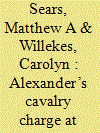

|
|
|
|
|
| Summary/Abstract |
The Battle of Chaeronea, fought in 338 BCE between Philip of Macedon and the Greek city-states, is known only from meager literary evidence and a few archaeological finds. For decades, scholars had reconstructed the battle to include a cavalry charge led by Philip’s eighteen-year-old son, the future Alexander the Great. More recently, this cavalry charge has been called into question, primarily because of the supposed maxim that cavalry will not trample disciplined infantry. A reconsideration of the evidence, however, including skeletal remains from the battle and studies of equine behavior, suggests that Alexander’s charge was feasible.
|
|
|
|
|
|
|
|
|
|
|
|
|
|
|
|
| 3 |
ID:
125968


|
|
|
|
|
| Publication |
2013.
|
| Summary/Abstract |
After Issus (333 BC), Alexander took possession of Syria and the Levant coast. The next year he attacked Tyre, a rich and strategic Phoenician port and its largest city-state. Tyre was the only Persian port that had not capitulated. Even this far into the war, the Persian navy still posed a threat. Tyre was located both on the Mediterranean coast and an island with two natural harbours. Alexander built a causeway to allow his army to take the town by land. This engineering feat showed the true extent of his brilliance: he built a kilometer-long causeway on a natural land bridge no more than two metres deep. He then constructed two towers 150-feet high at the end of the causeway. The Tyrians, however, quickly counterattacked. They filled an old transport ship with wood, pitch, sulphur and other combustibles, lit it on fire creating a primitive form of napalm, and ran it up onto the causeway, which was engulfed by the flames.
|
|
|
|
|
|
|
|
|
|
|
|
|
|
|
|
| 4 |
ID:
064957
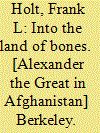

|
|
|
|
|
| Publication |
Berkeley, University of California Press, 2005.
|
| Description |
xiii, 241p.: ill, maps.Hbk
|
| Standard Number |
0520245539
|
|
|
|
|
|
|
|
|
|
|
|
Copies: C:1/I:0,R:0,Q:0
Circulation
| Accession# | Call# | Current Location | Status | Policy | Location |
| 049930 | 939.6/HOL 049930 | Main | On Shelf | General | |
|
|
|
|
| 5 |
ID:
120860
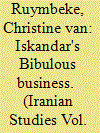

|
|
|
|
|
| Publication |
2013.
|
| Summary/Abstract |
The twelfth-century poet Nizami Ganjavi has produced his version of the adventures of Alexander as a unique composition mingling known Persian historiography and Qur'anic legends with unusual non-Islamic, especially Greek, elements in order to create his Iskandar-nama (containing two parts, the Sharaf-nama and the Iqbal-nama) as a synthesis of eastern and western cultures. A first point is the examination of the reasons behind the importance given to wine and drunkenness within the narrative. The poet has stressed this further by heading each chapter with a call to the saqi. The essay examines the appositeness of the invocations with the episodes in the narrative, it analyses examples of wine imagery (containing references to medicine, to the mirror and to religion) and questions the relation between authorial persona, narrator and characters, examining in particular the famous teetotaler claim in one of the introductory chapters of the first part of the Iskandar-nama.
|
|
|
|
|
|
|
|
|
|
|
|
|
|
|
|
| 6 |
ID:
023799
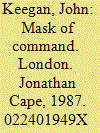

|
|
|
|
|
| Publication |
London, Jonathan Cape, 1987.
|
| Description |
359p.: ill.Hbk
|
| Standard Number |
022401949X
|
|
|
|
|
|
|
|
|
|
|
|
Copies: C:1/I:0,R:0,Q:0
Circulation
| Accession# | Call# | Current Location | Status | Policy | Location |
| 029447 | 923.5/KEE 029447 | Main | On Shelf | General | |
|
|
|
|
| 7 |
ID:
126470
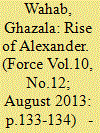

|
|
|
|
|
| Publication |
2012.
|
| Summary/Abstract |
In our last episode we saw Alexander succeed Philip II as king of Macedonia. In this episode we will trail him on his campaign against the Persians, then the largest empire on earth
From his first regnal year till he breathed his last, Alexander unleashed an unrelenting spate of campaigns that would see him overrun all Asia till the doors of India. His conquests included, from west to east, the Balkans (former Yugoslavia), Anatolia (Turkey), Egypt, Gaza, Phoenicia (Lebanon), Judea (Israel and Jordan), the Levant (Syria), Mesopotamia and Babylonia (Iraq), Persia (Iran) and Bactria (Afghanistan). His empire extended as far as the Hindukush mountains.
|
|
|
|
|
|
|
|
|
|
|
|
|
|
|
|
| 8 |
ID:
113153


|
|
|
|
|
|
|
|